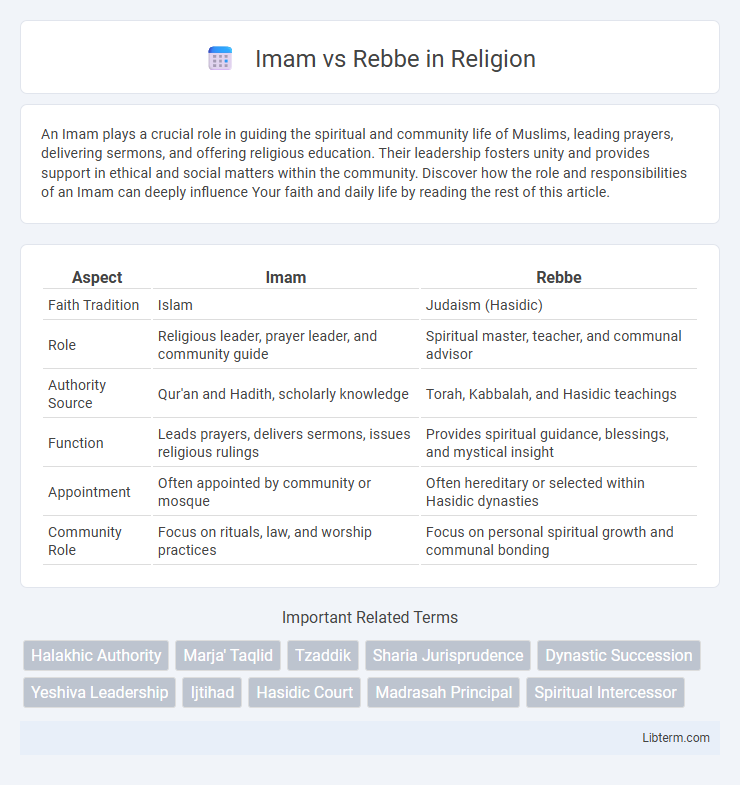An Imam plays a crucial role in guiding the spiritual and community life of Muslims, leading prayers, delivering sermons, and offering religious education. Their leadership fosters unity and provides support in ethical and social matters within the community. Discover how the role and responsibilities of an Imam can deeply influence Your faith and daily life by reading the rest of this article.
Table of Comparison
| Aspect | Imam | Rebbe |
|---|---|---|
| Faith Tradition | Islam | Judaism (Hasidic) |
| Role | Religious leader, prayer leader, and community guide | Spiritual master, teacher, and communal advisor |
| Authority Source | Qur'an and Hadith, scholarly knowledge | Torah, Kabbalah, and Hasidic teachings |
| Function | Leads prayers, delivers sermons, issues religious rulings | Provides spiritual guidance, blessings, and mystical insight |
| Appointment | Often appointed by community or mosque | Often hereditary or selected within Hasidic dynasties |
| Community Role | Focus on rituals, law, and worship practices | Focus on personal spiritual growth and communal bonding |
Understanding the Terms: Imam and Rebbe
The term "Imam" refers to a leader in Islamic religious practice, often guiding prayer and community worship, rooted deeply in Islamic theology and jurisprudence. In contrast, "Rebbe" is a spiritual mentor within Judaism, particularly in Hasidic communities, embodying both religious authority and personal guidance based on mystical traditions. Both roles function as central figures in their respective faiths, shaping religious life and community cohesion through distinct cultural and theological frameworks.
Historical Origins of Imam and Rebbe
Imams in Islam originate from the early Islamic community, serving as religious leaders and interpreters of the Quran, with roots tracing back to the Prophet Muhammad and his family, especially in Shia traditions where Imams are considered divinely appointed. The title of Rebbe in Judaism developed within Hasidic communities in Eastern Europe during the 18th century, symbolizing a spiritual leader who provides guidance and interpretation of Jewish law and mysticism. Both figures hold pivotal roles in their religious histories, reflecting deep theological and communal leadership tied to their specific faith traditions.
Religious Roles and Responsibilities
Imams serve as prayer leaders, Quran reciters, and community guides in Islamic worship and law, responsible for leading daily prayers, delivering sermons (khutbah), and offering religious education. Rebbes function as spiritual mentors and leaders within Hasidic Judaism, providing personalized guidance, interpreting Torah teachings, and fostering communal unity and religious devotion. Both roles emphasize leadership and teaching but differ in ritual practices and theological frameworks specific to Islam and Hasidic Judaism.
Spiritual Leadership in Islam vs Judaism
Imams in Islam serve as religious leaders who lead prayers, provide spiritual guidance, and interpret the Quran, playing a central role in community worship and Islamic law. Rebbes in Judaism act as spiritual mentors and guides, particularly within Hasidic communities, offering personalized religious instruction and fostering deep mystical connections to Jewish tradition. Both leaders embody essential facets of spiritual leadership, emphasizing communal cohesion and individual faith development within their respective religious frameworks.
Selection and Succession Process
Imams in Shia Islam are believed to be divinely appointed leaders, with succession typically passing through lineage, specifically from Prophet Muhammad's family, emphasizing spiritual and hereditary legitimacy. In contrast, the Rebbe in Hasidic Judaism is often chosen based on spiritual wisdom, community respect, and dynastic heritage, with succession frequently determined by the current Rebbe's designation or direct familial inheritance. Both roles carry significant religious authority but differ fundamentally in their selection rituals and criteria for succession.
Community Influence and Guidance
Imams serve as spiritual leaders in Muslim communities, providing religious guidance through Quranic teachings, leading prayers, and addressing communal issues based on Islamic law. Rebbes function as central figures in Hasidic Judaism, offering personalized spiritual mentorship, interpreting Torah teachings, and fostering strong communal bonds through traditions and rituals. Both roles emphasize direct influence on their communities by shaping religious practices, offering moral support, and reinforcing cultural identity.
Imam vs Rebbe: Teaching and Interpretation
Imams in Islam serve as authoritative religious leaders who lead prayers and provide interpretations of the Quran based on established Islamic jurisprudence, emphasizing strict adherence to Sharia law and the Prophet Muhammad's teachings. Rebbes in Judaism, particularly within Hasidic communities, act as spiritual guides who interpret the Torah and Talmud with a mystical and personalized approach, fostering deep communal bonds and individual spiritual growth. Both roles emphasize teaching and interpretation but differ in their religious texts, doctrinal foundations, and methods of spiritual leadership.
Rituals and Ceremonial Functions
Imams lead Islamic congregational prayers, guiding rituals such as Salah five times a day and officiating key ceremonies like Friday Jumu'ah, Eid prayers, and marriage Nikah. Rebbes serve as spiritual leaders in Hasidic Judaism, conducting rituals including Torah study, prayer gatherings (tish), and lifecycle events such as weddings and brit milah (circumcision). Both roles emphasize ceremonial leadership but differ in doctrinal context and ritual specifics reflecting Islamic and Jewish traditions.
Contemporary Relevance and Challenges
Contemporary Imams navigate diverse Muslim communities worldwide, addressing challenges like sectarianism, Islamophobia, and modern ethical dilemmas while guiding congregants through digital engagement and interfaith dialogue. Rebbes in Hasidic Judaism maintain spiritual authority, providing personal guidance and preserving traditions amid secular pressures and evolving societal values. Both figures face the task of balancing doctrinal fidelity with contemporary relevance, emphasizing the adaptation of ancient teachings to modern life without compromising core beliefs.
Comparative Insights: Imam and Rebbe
Imams and Rebbes both serve as spiritual leaders within Islam and Judaism, respectively, guiding their communities through religious teachings and practices. Imams often lead prayers and provide religious rulings based on the Quran and Hadith, while Rebbes offer personalized spiritual mentorship rooted in Hasidic traditions and Jewish law. The roles reflect differing theological frameworks, with Imams emphasizing communal worship and jurisprudence, and Rebbes focusing on mystical guidance and the spiritual growth of followers.
Imam Infographic

 libterm.com
libterm.com